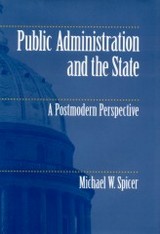
Viewed alternately as an obstacle to justice, an impediment to efficient government, and a tool by which some groups gain benefits and privileges at the expense of others, public administration threatens to become the whipping boy of American government. In this innovative look at the nation's bureaucracy, Michael W. Spicer revisits the values of the Constitution in order to reconcile the administrative state to its many critics.
Drawing on political and social philosophy, Spicer argues that there is a fundamental philosophical conflict over the role of reason in society between writers in public administration and the designers of the American Constitution. This examination of worldviews illuminates the problem that American government faces in trying to ground a legitimate public administration in the Constitution. Defending and developing the Founders' idea that political power, whatever its source, must be checked, he critically examines existing ideas about the role of public administration in American governance and offers an alternative vision of public administration more in line with the Founders' constitutional design. This book will provide fresh insights for anyone interested in the role of public administration in the United States today.

Scholars of public administration have historically too often been disdainful towards politics in the field, viewing political activities and interests as opportunities for corruption, mismanagement, and skewed priorities. Supporters of this anti-political stance have become even more strident in recent years, many of them advancing scientific models for the study and practice of public administration and governance.

A critical examination of public administration's pervasive vision of a powerful state
Woodrow Wilson argued for a state led by a powerful government, guided by science and enlightened experts, for the accomplishment of a set of collective purposes—in other words, a purposive state. Michael Spicer contends that though Wilson and those who followed him have not typically explored questions of political and constitutional theory in their writing, a clear and strong vision of the state has emerged in their work nonetheless.
Building upon the work of Dwight Waldo and others who have sought to explore and reveal the political theory behind the seemingly neutral language of administration, Spicer explores the roots—both historical and philosophical—of the purposive state. He considers the administrative experience of 18th-century Prussia and its relationship to the vision of the purposive state, and examines the ways this idea has been expressed in the 20th century. He then looks at the practical problems such a vision creates for public policy in a fragmented postmodern political culture. Finally, Spicer explores an alternative view of public administration—one based on a civil association model appropriate to our constitutional traditions and contemporary culture.
READERS
Browse our collection.
PUBLISHERS
See BiblioVault's publisher services.
STUDENT SERVICES
Files for college accessibility offices.
UChicago Accessibility Resources
home | accessibility | search | about | contact us
BiblioVault ® 2001 - 2024
The University of Chicago Press









